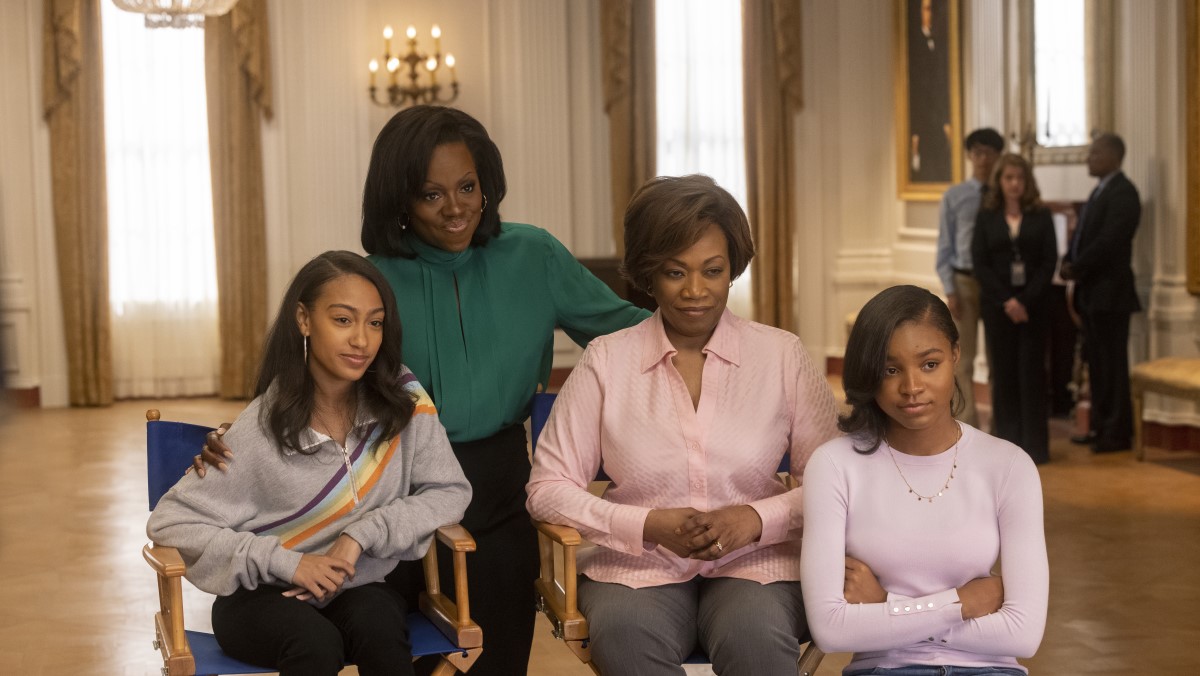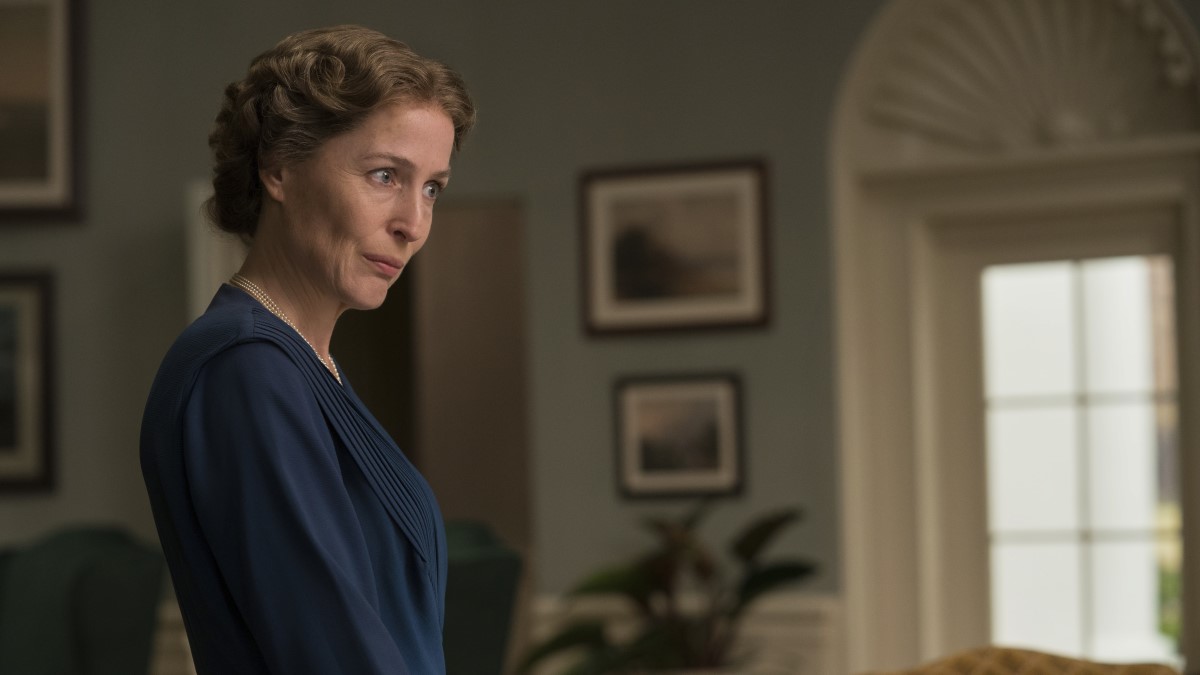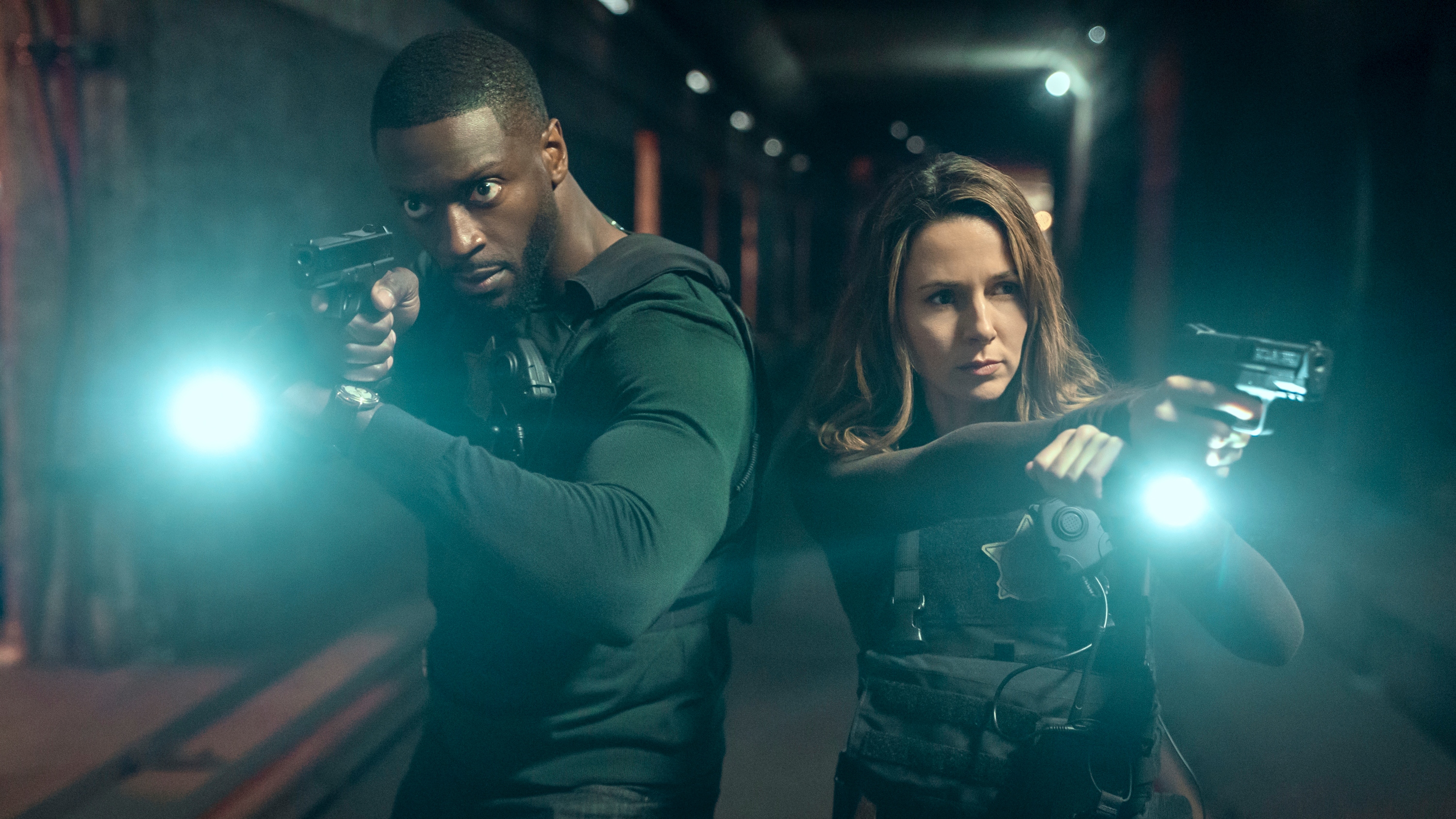What to Watch Verdict
Wins and losses make for some compelling and clumsy moments.
Pros
- +
Gillian Anderson's reactions to the dossier
- +
The role of the first daughters
- +
Celebratory archive footage
- +
The lived-in bond between Michelle Pfeiffer and Dakota Fanning
Cons
- -
Supporting players are not fleshed out
- -
How did they not notice the agent taking photos?
NOTE: This post contains spoilers for The First Lady season 1 episode 6, "Shout Out.” Catch up with the series with our recap of The First Lady season 1 episode 5 right here.
Compromise is considered fundamental to a successful marriage and this sentiment rings true in the storylines of this week’s The First Lady. We've seen each woman sacrifice their dreams to support their husband’s political career but they continue to explore trailblazing actions. Highs and lows are endured equally in "Shout Out."
While Michelle (Viola Davis) and Betty (Michelle Pfeiffer) are dealing directly with political debates ignited by the Defense of Marriage Act (DOMA) and the Equal Rights Act (ERA), Eleanor (Gillian Anderson) is taking time to focus on herself for once. Eleanor is the main story, with her blossoming romance with Hick (Lily Rabe) offering a change of pace. There is a somewhat clumsy link, however, between Michelle arguing with Barack (O-T Fagbenle) about why he needs to support gay marriage.
It's 1933 and J. Edgar Hoover’s men at the FBI are responsible for the surveillance of the First Lady, which includes snaps of her holding hands with Hick in public and embracing in the wilderness. Them not noticing the agent taking a photograph in a lobby is one thing, but on a secluded camping trip? The equipment in this decade was not that good. Or maybe the sticky marshmallow kisses are so distracting that neither Eleanor nor Hick saw (or heard) the agent.
Eleanor is in the dark until Franklin (Kiefer Sutherland) shows her the file Hoover smugly left in his hands. She has come to ask her husband to give Hick a job in the administration after her girlfriend handed in her resignation — Hick will later explain that she did so because she couldn’t be objective. Anderson’s reaction to the images capturing what she thought were private moments is some of her best work to date in the series (finally pulling focus from her false teeth).
Not only is her new romance violated, but she is also acutely aware of how much this will hurt her husband — not to mention the scandal this could cause. An affair would cause quite the consternation in any decade (as the '90s proved). However, a same-sex union in 1933 is another story.
Franklin agrees to give Hick the job Eleanor initially requested in a surprise twist. Her husband burns the photographs and tells her he's happy she still has the capacity for love. Franklin weeps when he is alone, but it's heartening to see his open mind, which ultimately leads to Hick getting a room in the White House on the other side of the secret door into Eleanor’s bedroom.
The latest updates, reviews and unmissable series to watch and more!
The confessional is a surprisingly lovely and candid conversation that underscores the unorthodox dynamic between the pair. It feels a little out of nowhere that Franklin would be this chill about his wife’s affair, but it's hard to grasp the supporting players due to The First Lady’s structure. Further reading is required to get a handle on the big picture.
Louis (Jackie Earle Haley) has been a constant to the couple, so his death hits Eleanor hard, but the depth of this relationship is evident only because of the performances. Anna Eleanor Roosevelt (Cailee Spaeny) will take on a more significant role in her father’s administration and a daughter plot links all three timelines.
In 2012, Michelle and her daughters are frustrated with Barack’s reluctance to show his public support for marriage equality. This plot is less about Michelle (though she does have her tactics involving getting the vice president to stick his neck out) and more about teen Malia (Lexi Underwood) following in her mother’s footsteps in successfully arguing a point.
Barack is somewhat condescending to Michelle when he explains how politics work in an election year and believes he will lose the second term if he speaks out now. We know this won’t be the case, so the tension is somewhat reduced.
Eventually, it takes delivering one pizza to Malia and her study group for Barack to accept the opinions of the next generation. He speaks out against DOMA on television with his family watching and emotional archive footage reveals what happened next — a reminder of how hard LGBTQ+ activists fought for equality. It is a celebratory moment compared to the compromise Betty has to make.

Feeling a giddy sense of achievement after the rapid rise in mammogram appointments, Betty uses her position to do more. "I've learned to enjoy it rather than resent it," she describes her new outlook on her First Lady role to her daughter Susan (Dakota Fanning). Her latest target is to help get the ERA ratified — viewers who watched FX’s Mrs. America will know the uphill battle against conservative factions led by Phyllis Schlafly — and she uses resources in the East Wing to get this done.
It's wonderful seeing Betty energized with her best friend Nancy (Judy Greer) at her side. Unfortunately, men like Donald Rumsfeld (Derek Cecil) and Dick Cheney (Rhys Wakefield) are unhappy with Betty using her voice to support the ERA. They use fear to bend her husband to their will, dangling the threat of the conservative favorite Ronald Reagan in front of Gerry (Aaron Eckhart). A fight erupts between the couple, but by the end of the episode, Betty believes she has to put her work on hold to ensure they can stop the more right-wing figures from gaining power.
Patty Hearst’s kidnapping is also causing concern as Susan has been targeted, which causes the Fords to pull her out of school in her final four weeks. The bond between mother and daughter is lovely to watch. Pfeiffer and Fanning first worked together in 2001 on I Am Sam and their relationship has a lived-in quality. The plan to have prom at the White House (so Susan can attend) sounds like fiction, but it happened — though not because of a security concern.
Compromises are made throughout "Shout Out" and these developments point to more tricky waters ahead.
Watch The First Lady on Showtime in the US and in the UK you can now stream it on Paramount Plus.
Emma Fraser spends most of her time writing about TV, fashion, and costume design; Dana Scully is the reason she loves a pantsuit. Words can also be found at Vulture, Elle, Primetimer, Collider, Little White Lies, Observer, and Girls on Tops. Emma has a Master’s in Film and Television, started a (defunct) blog that mainly focused on Mad Men in 2010, and has been getting paid to write about TV since 2015. It goes back way further as she got her big start making observations in her diary about My So-Called Life’s Angela Chase (and her style) at 14.


